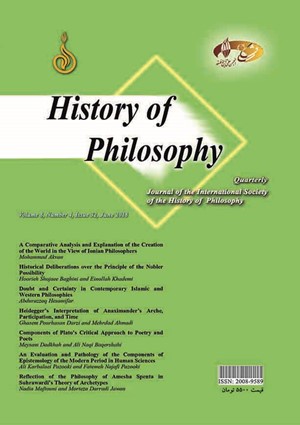Doubt and Certainty in Contemporary Islamic and Western Philosophies
Subject Areas : Geneology of philosophical schools and Ideas
1 - دانشگاه بينالمللي امام خميني
Keywords: doubt certainty knowledge epistemology truth ,
Abstract :
Doubt and certainty are two soulish states which form problematic and certain knowledge in the process of human cognition. Problematic knowledge is mainly obtained in the realm of empirical sciences, while certain knowledge is mostly acquired in the domain of certain non-empirical sciences such as philosophy, logic, mathematics, and gnosis. In the history of philosophy, philosophers often sought certain knowledge and believed that it is possible to attain the truth. In contrast, skeptics undermined the acquisition of such knowledge and did not believe in the existence of any kind of truth. The confrontations of these two groups have always constituted a part of the history of philosophy. Such a confrontation has been revived in contemporary philosophy as a result of the discussions which are made in modern epistemology both in Islamic philosophy and Western philosophy. On the one hand, contemporary Muslim philosophers have tried to defend the strong epistemological principles of Islamic philosophy through negating the views of skeptics. They believe in realism in epistemology and reject any interpretation of knowledge which is based on subjective idealism. On the other hand, at least some contemporary Western philosophers have tried to provide some responses to the questions posed by skeptics by developing a number of new views. In this comparative study, the author has tried to evaluate the attempts of a group of philosophers of each side in this regard. It is eventually concluded that the responses of Islamic philosophers to the posed questions enjoy a stronger basis both in the past and at present.
احمدي، بابک، کتاب ترديد، تهران، نشر مرکز، 1374.#
ارسطو، مابعدالطبيعه، ترجمه محمدحسن لطفي، تهران، انتشارات طرح نو، 1378.#
بزرگمهر، منوچهر، فلسفه تحليل منطقي، تهران، انتشارات خوارزمي، 1357.#
برک، پيتر، مونتني، ترجمه اسماعيل سعادت، تهران، انتشارات طرح نو، 1373.#
حجت، مينو، بيدليلي باور: تأملي در در باب يقين ويتگنشتاين، تهران، انتشارات هرمس، 1387.#
ژيلسون، اتين، نقد تفکر فلسفي غرب از قرون وسطي تا اوائل قرن حاضر، ترجمه احمد احمدي، تهران، انتشارات حکمت، 1402ق.#
طباطبايي، محمد حسين، بدايةالحكمة، قم، نشر دانش اسلامي، 1362.#
طباطبايي، محمد حسين، نهاية الحكمة، قم، مؤسسه نشر اسلامي، 1362.#
طباطبايي، محمد حسين، مجموعه رسائل، بکوشش سيد هادي خسروشاهي، تهران، دفتر نشر فرهنگ اسلامي1370.#
طباطبايي، محمد حسين، اصول فلسفه و روش رئاليسم، مقدمه و پاورقي مرتضي مطهري، تهران، انتشارات حکمت، ج1 و 2 و 3، 1359. #
مطهري، مرتضي، شرح مبسوط منظومه، تهران، انتشارات حکمت، ج2، 1366.#
مطهري، مرتضي، شناخت، تهران، انتشارات شريعت، 1361.#
مور، جرج ادوارد، «برهان عالم خارج»، ترجمه منوچهر بديعي، فصلنامه ارغنون، س2، ش 7و8، پاييز و زمستان 1374.#
ويتگشتاين، لودويگ، در باب يقين، ترجمه مالک حسيني، تهران، انتشارات هرمس، 1387.#
Carr, Brian, “Truth” in An Encyclopedia of Philosophy, edited by G. H. R. Parkinson, 1988.#
Kant, Immanuel, Critique of Pure Reason, trans. Norman Kemp Smith, London: Macmillan and Co Ltd, 1964.#
Moore, G. E., “Four Forms of Scepticism”, Analytic Philosophy: An Anthology, edited by A. P. Martinich and David Sosa, Massachusetts and Oxford: Blackwell, 2001.#


